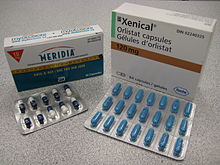|
|
ManagementMain article: Management of obesity
 
Orlistat (Xenical), the most commonly used medication to treat obesity, and sibutramine (Meridia), a recently withdrawn medication due to cardiovascular side effects
The main treatment for obesity consists of dieting and physical exercise.[63] Diet programs may produce weight loss over the short term,[140] but maintaining this weight loss is frequently difficult and often requires making exercise and a lower food energy diet a permanent part of a person's lifestyle.[141][142] Success rates of long-term weight loss maintenance with lifestyle changes are low, ranging from 2–20%.[143] Dietary and lifestyle changes are effective in limiting excessive weight gain in pregnancy and improve outcomes for both the mother and the child.[144]
One medication, orlistat (Xenical), is current widely available and approved for long term use. Weight loss however is modest with an average of 2.9 kg (6.4 lb) at 1 to 4 years and there is little information on how these drugs affect longer-term complications of obesity.[145] Its use is associated with high rates of gastrointestinal side effects[145] and concerns have been raised about negative effects on the kidneys.[146] Two other medications are also available. Lorcaserin (Belviq) results in an average 3.1 kg weight loss (3% of body mass) greater than placebo over a year.[147] A combination of phentermine and topiramate (Qsymia) is also somewhat effective.[148]
The most effective treatment for obesity is bariatric surgery. Surgery for severe obesity is associated with long-term weight loss and decreased overall mortality. One study found a weight loss of between 14% and 25% (depending on the type of procedure performed) at 10 years, and a 29% reduction in all cause mortality when compared to standard weight loss measures.[149] However, due to its cost and the risk of complications, researchers are searching for other effective yet less invasive treatments.
 该贴已经同步到 jacky的微博 该贴已经同步到 jacky的微博 |
评分
-
查看全部评分
|
 |小黑屋|手机版Mobile|体能论坛
( 粤ICP备15092216号-2 )
|小黑屋|手机版Mobile|体能论坛
( 粤ICP备15092216号-2 )